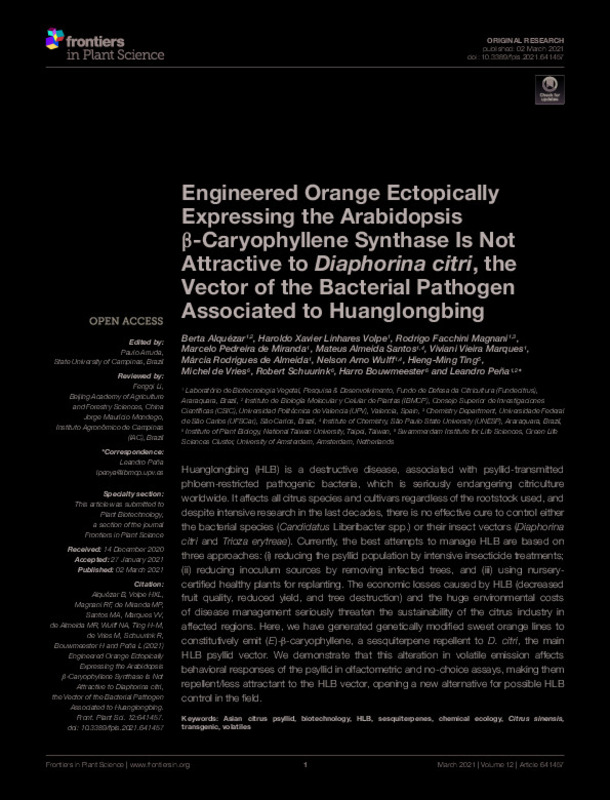JavaScript is disabled for your browser. Some features of this site may not work without it.
Buscar en RiuNet
Listar
Mi cuenta
Estadísticas
Ayuda RiuNet
Admin. UPV
Engineered Orange Ectopically Expressing the Arabidopsis beta-Caryophyllene Synthase Is Not Attractive to Diaphorina citri, the Vector of the Bacterial Pathogen Associated to Huanglongbing
Mostrar el registro sencillo del ítem
Ficheros en el ítem
| dc.contributor.author | Alquézar-García, Berta
|
es_ES |
| dc.contributor.author | Linhares Volpe, Haroldo Xavier
|
es_ES |
| dc.contributor.author | Facchini Magnani, Rodrigo
|
es_ES |
| dc.contributor.author | Pedreira de Miranda, Marcelo
|
es_ES |
| dc.contributor.author | Almeida Santos, Mateus
|
es_ES |
| dc.contributor.author | Vieira Marques, Viviani
|
es_ES |
| dc.contributor.author | Rodrigues de Almeida, Márcia
|
es_ES |
| dc.contributor.author | Arno Wulff, Nelson
|
es_ES |
| dc.contributor.author | Ting, Hieng-Ming
|
es_ES |
| dc.contributor.author | de Vries, Michel
|
es_ES |
| dc.contributor.author | Schuurink, Robert
|
es_ES |
| dc.contributor.author | Bouwmeester, Harro
|
es_ES |
| dc.contributor.author | Peña, Leandro
|
es_ES |
| dc.date.accessioned | 2022-06-20T18:05:18Z | |
| dc.date.available | 2022-06-20T18:05:18Z | |
| dc.date.issued | 2021-03-02 | es_ES |
| dc.identifier.uri | http://hdl.handle.net/10251/183491 | |
| dc.description.abstract | [EN] Huanglongbing (HLB) is a destructive disease, associated with psyllid-transmitted phloem-restricted pathogenic bacteria, which is seriously endangering citriculture worldwide. It affects all citrus species and cultivars regardless of the rootstock used, and despite intensive research in the last decades, there is no effective cure to control either the bacterial species (Candidatus Liberibacter spp.) or their insect vectors (Diaphorina citri and Trioza erytreae). Currently, the best attempts to manage HLB are based on three approaches: (i) reducing the psyllid population by intensive insecticide treatments; (ii) reducing inoculum sources by removing infected trees, and (iii) using nursery-certified healthy plants for replanting. The economic losses caused by HLB (decreased fruit quality, reduced yield, and tree destruction) and the huge environmental costs of disease management seriously threaten the sustainability of the citrus industry in affected regions. Here, we have generated genetically modified sweet orange lines to constitutively emit (E)-beta-caryophyllene, a sesquiterpene repellent to D. citri, the main HLB psyllid vector. We demonstrate that this alteration in volatile emission affects behavioral responses of the psyllid in olfactometric and no-choice assays, making them repellent/less attractant to the HLB vector, opening a new alternative for possible HLB control in the field. | es_ES |
| dc.description.sponsorship | This work was funded by the Fundo de Defesa da Citricultura (Fundecitrus), Sao Paulo Research Foundation (FAPESP, grant #2015/07011-3), and EU H2020 Innovation Action Program (grant #817526). Consent for research and field trial of genetically modified organisms was granted by the National Technical Biosafety Commission from Brazil (CTNBio) to Fundecitrus. | es_ES |
| dc.language | Inglés | es_ES |
| dc.publisher | Frontiers Media SA | es_ES |
| dc.relation.ispartof | Frontiers in Plant Science | es_ES |
| dc.rights | Reconocimiento (by) | es_ES |
| dc.subject | Asian citrus psyllid | es_ES |
| dc.subject | Biotechnology | es_ES |
| dc.subject | HLB | es_ES |
| dc.subject | Sesquiterpenes | es_ES |
| dc.subject | Chemical ecology | es_ES |
| dc.subject | Citrus sinensis | es_ES |
| dc.subject | Transgenic | es_ES |
| dc.subject | Volatiles | es_ES |
| dc.subject.classification | BIOQUIMICA Y BIOLOGIA MOLECULAR | es_ES |
| dc.title | Engineered Orange Ectopically Expressing the Arabidopsis beta-Caryophyllene Synthase Is Not Attractive to Diaphorina citri, the Vector of the Bacterial Pathogen Associated to Huanglongbing | es_ES |
| dc.type | Artículo | es_ES |
| dc.identifier.doi | 10.3389/fpls.2021.641457 | es_ES |
| dc.relation.projectID | info:eu-repo/grantAgreement/EC/H2020/817526/EU | es_ES |
| dc.relation.projectID | info:eu-repo/grantAgreement/FAPESP//2015%2F07011-3/ | es_ES |
| dc.rights.accessRights | Abierto | es_ES |
| dc.contributor.affiliation | Universitat Politècnica de València. Departamento de Biotecnología - Departament de Biotecnologia | es_ES |
| dc.description.bibliographicCitation | Alquézar-García, B.; Linhares Volpe, HX.; Facchini Magnani, R.; Pedreira De Miranda, M.; Almeida Santos, M.; Vieira Marques, V.; Rodrigues De Almeida, M.... (2021). Engineered Orange Ectopically Expressing the Arabidopsis beta-Caryophyllene Synthase Is Not Attractive to Diaphorina citri, the Vector of the Bacterial Pathogen Associated to Huanglongbing. Frontiers in Plant Science. 12:1-15. https://doi.org/10.3389/fpls.2021.641457 | es_ES |
| dc.description.accrualMethod | S | es_ES |
| dc.relation.publisherversion | https://doi.org/10.3389/fpls.2021.641457 | es_ES |
| dc.description.upvformatpinicio | 1 | es_ES |
| dc.description.upvformatpfin | 15 | es_ES |
| dc.type.version | info:eu-repo/semantics/publishedVersion | es_ES |
| dc.description.volume | 12 | es_ES |
| dc.identifier.eissn | 1664-462X | es_ES |
| dc.identifier.pmid | 33763099 | es_ES |
| dc.identifier.pmcid | PMC7982956 | es_ES |
| dc.relation.pasarela | S\459835 | es_ES |
| dc.contributor.funder | European Commission | es_ES |
| dc.contributor.funder | Fundo de Defesa da Citricultura | es_ES |
| dc.contributor.funder | National Technical Commission on Biosafety, Brazil | es_ES |
| dc.contributor.funder | Fundação de Amparo à Pesquisa do Estado de São Paulo | es_ES |








